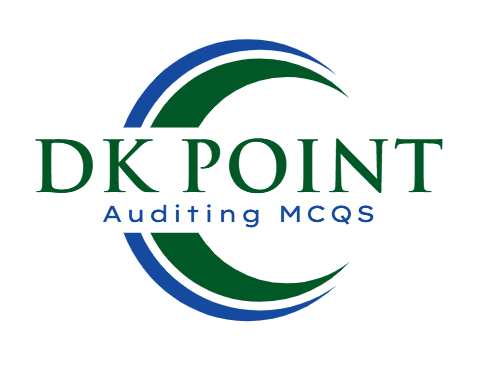Auditing MCQs with answers for test preparation. Auditing MCQs with answers PDF. Auditing question and answer for Senior Auditor, Junior Auditor and Accountant. Auditing MCQs for ppsc, fpsc, nts, etea, kppsc, spsc. Internal audit MCQs with answers for auditing tests online. Our MCQs cover a wide spectrum of auditing topics, including audit planning, internal audit, introduction to auditing, risk assessment, internal controls, audit evidence, and more. Accounting Mcqs

In determining the level of materiality for an audit, what should not be considered ?
A. The auditor’s remuneration
B. Prior year’s financial statements
C. . Prior year’s errors
D. Adjusted interim financial statements_____the audit risk, _____ the materiality and _____ the audit effort ?
A. Lower, Higher, Higher
B. Lower, Higher, Lower
C. Lower, Lower, Higher
D. Higher, Lower, LowerBalance sheet does not include ?
A. Vouching of income and expense accounts related to assets and liabilities
B. Examination of adjusting and closing entries
C. Routine checks
D. Verification of assets and liabilitiesWhich of the following statements is not true about continuous audit ?
A. It is needed when the organization has a good internal control system
B. It is expensive
C. It is conducted at regular interval
D. It may be carried out on daily basisBalance sheet audit includes verification of ?
A. Liabilities
B. Assets
C. Income and expense accounts where appropriate
D. All of themAudit in depth is synonymous for ?
A. Completed audit
B. Final audit
C. Detailed audit
D. Complete auditNature, timing and extent of substantive procedures is _____ related to assessed level of control risk ?
A. disproportionately
B. inversely
C. randomly
D. directlyOf the following, which is the least persuasive type of audit evidence ?
A. Carbon copies of sales invoices inspected by the auditor
B. Computations made by the auditor
C. Bank statements obtained from the client
D. Documents obtained by auditor from third parties directly.Which of the following is not an analytical procedure ?
A. Comparing the actual costs with standard costs
B. Tracing of purchases recurred in the purchase book to purchase invoices.
C. Comparing aggregate wages paid to number of employees
D. None of themWhich of the following is a revenue reserve ?
A. Debenture redemption reserve
B. Capital reserve
C. Capital redemption reserve
D. Security premium account
